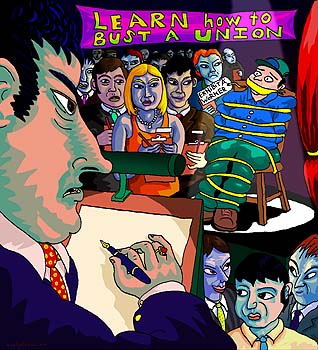Greedy CEO's get big bucks for
layoffs
by Peter Werbe
Getting rid of workers is good
businessat least for the top brass. According to a report
just issued by two groups tracking economic trends, last
year 30 U.S. firms, which announced lay-offs ranging from
2,800 to 48,640 workers, saw their chief executive
officers (CEOs) receive higher than average pay rewards
for weilding the axe.
The layoff leaders enjoyed an increase in total direct
compensation of 67 percentfar above the average of 54%
for executives at the country's top firms. By contrast,
U.S. workers received only a three percent raise in
wages.
 |
Image:
JPEG/144 Pix High Resolution (823K)
For
high resolution illustrations, fill in this quick
payment form
Click on image. Enter your account and password.
When the larger image has finished loading into
your browser, click and hold down your mouse on
the image. A dialogue box will appear. Slide your
mouse to the "Save to:" and download
the image file to your computer. |
Chuck Collins, co-director of
the Boston-based United for a Fair Economy (UFE), which
issued the report, told the Metro Times, "This is
part of a general breakdown of our social fabric.
Particularly the corporate compact between corporations
and their workers and communities."
The 20-page paper shows the average gap between the
leading job-cutters' salaries and bonuses (even before
including stock options and long-term compensation) and
the wage of their lowest-paid full-time worker was 178 to
one. AT&T president Robert Allen, who booted nearly
50,000 workers last year, received a compensation package
of $86.5 million which translates to a CEO-to-worker wage
ratio of 232:1.
Collins ascribes this growing gap to the decline of the
labor movement which previously fought for wage increases
as the profitability of a company rose. "As a result
of union busting," he says, "the standard of
living for most Americans has been flat for the last 20
years." By contrast, the richest one-half of one
percent of American families increased their wealth by
$1.45 trillion between 1983 and 1989.
Collins thinks the rules have been changed to favor large
asset owners creating a fundamental power shift.
"Institutions representing the voice of workers have
diminished, civic and community institutions have
declined at the same time the power of corporations and
the power of money to buy influence has increased,"
he says. "This is what America looks like when
corporations rule. They reward themselves. They get
enormous amounts of corporate welfare. They use the
government to distribute our wealth to them."
There are currently efforts at the Congressional level to
control excessive corporate pay. U.S. Representative
Martin Sabo (D-MN) and 35 co-sponsors have introduced
legislation that would cap the deductability of CEO pay
at 25 times the lowest paid worker in a firm. Currently,
all executive compensation is deductable. "Because
corporations deduct excessive pay from their taxes, the
remaining taxpayers pick up the tab," according to
Sabo. If the law had been in place last year, the top 365
firms would have paid an additional $514 million in
increased corporate taxes.
Collins admits this reform is "modest," but
says it is a step toward the concept that there should be
a fairer ratio between the top and bottom.
"Ultimately, we have to shift the power back,"
says Collins. "We have to remove the overwhelming
power of money from politics. and restore the ability of
ordinary people to have a say in how the economy is
run."
Even some members of corporate America agree. Robert B.
Zevin, senior vice-president of United States Trust
Company of Boston, "a socially responsible investing
firm," thinks the problem can best be addressed by a
steeply progressive income or consumption tax.
"Higher taxes on gargantuan pay packages would
protect corporations from wasting their resources on a
competitive compensation race and protect society from
further demoralization and despair."
Peter Werbe
The Executive Excess Report is available from
United for a Fair Economy, 37 Temple Place, 5th Floor,
Boston MA 02111 for $6.50 or off the UFE web site at www.stw.org.
T
|
